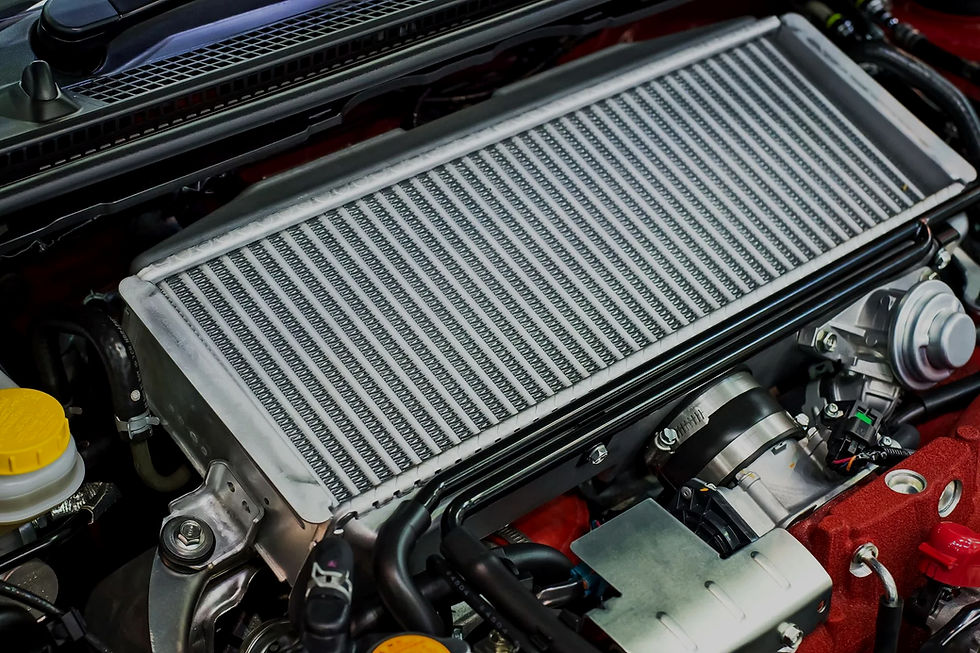Aluminum vs. Copper Radiator: Which One is Better?
- kaibin Li
- Apr 2, 2025
- 4 min read
Choosing the right radiator for your vehicle is crucial for optimal engine cooling and performance. The debate between aluminum vs. copper radiators has been ongoing for years. Both materials have unique advantages, and the best option depends on factors like heat dissipation, durability, weight, cost, and application.
In this article, we'll break down the differences between aluminum and copper radiators, helping you make an informed decision.、

1. Heat Dissipation & Cooling Efficiency
Efficient heat dissipation is the most important function of a radiator. Let’s compare how copper and aluminum perform in this area.
✅ Copper Radiators:
Copper has higher thermal conductivity than aluminum. This means it can transfer heat more efficiently per unit of material.
However, modern radiators are not made entirely of copper. Most are copper-brass radiators, with brass tanks and copper tubes. Brass has lower conductivity than copper, which slightly reduces efficiency.
Older vehicles and industrial applications often use copper radiators due to their high heat transfer capabilities.
✅ Aluminum Radiators:
While aluminum has a lower thermal conductivity, modern aluminum radiators use larger surface areas and thinner tubes to improve heat dissipation.
Aluminum radiators often feature wider and flatter tubes, increasing the contact area for airflow and maximizing cooling efficiency.
Due to design advancements, aluminum radiators can match or even outperform copper radiators in heat dissipation.
🏆 Winner: Copper (in pure conductivity), but modern aluminum radiators compensate with better design and larger surface areas.
2. Weight & Durability
For high-performance vehicles, weight is a crucial factor.
✅ Copper Radiators:
Copper is significantly heavier than aluminum. This added weight can negatively impact a vehicle’s performance, especially in racing or high-speed applications.
Copper is also more prone to corrosion over time, requiring more maintenance to prevent leaks.
✅ Aluminum Radiators:
Aluminum radiators are 50% lighter than copper-brass radiators, making them ideal for modern cars, performance vehicles, and racing applications.
They are also more corrosion-resistant, reducing the risk of leaks and increasing their lifespan.
🏆 Winner: Aluminum (lighter and more durable, making it ideal for modern vehicles).
3. Cost & Manufacturing
✅ Copper Radiators:
Copper is more expensive than aluminum, leading to higher manufacturing costs.
Due to its weight, copper radiators require more material, making production and transportation more costly.
The complexity of welding and assembling copper radiators adds to the expense.
✅ Aluminum Radiators:
Aluminum is more affordable and easier to manufacture.
Modern brazed aluminum radiators are manufactured in a way that allows for high efficiency and lower production costs.
Due to their lightweight nature, they also reduce fuel consumption in vehicles, offering long-term cost savings.
🏆 Winner: Aluminum (cheaper to produce and maintain).
4. Repairability & Longevity
✅ Copper Radiators:
Copper radiators are easier to repair. If damaged, individual tubes can be soldered or replaced, extending their lifespan.
However, they are more prone to corrosion and scaling, which can lead to reduced efficiency over time.
✅ Aluminum Radiators:
Aluminum radiators are harder to repair. If they develop leaks or cracks, they often need to be replaced entirely rather than repaired.
However, due to their superior corrosion resistance and durability, aluminum radiators generally have a longer lifespan than copper radiators.
🏆 Winner: Copper (easier to repair), but Aluminum (more durable in the long run).
5. Application: Where is Each Type Used?
Copper Radiators Are Commonly Used In:
✔️ Older Vehicles – Many classic cars still use copper-brass radiators.
✔️ Heavy-Duty Applications – Trucks, buses, and industrial machinery that require extreme heat dissipation.
✔️ Stationary Equipment – Power generators, large HVAC systems, and industrial cooling units.
Aluminum Radiators Are Commonly Used In:
✔️ Modern Vehicles – Most cars, motorcycles, and trucks manufactured today come with aluminum radiators.
✔️ Racing & Performance Cars – Due to their lightweight and superior cooling efficiency.
✔️ Electric Vehicles (EVs) – Aluminum radiators provide efficient cooling for EV batteries and power systems.
🏆 Winner: Aluminum (ideal for modern vehicles, racing, and performance applications).
Final Verdict: Which One Should You Choose?
🔷 Choose a Copper Radiator If:
✔️ You need maximum thermal conductivity.
✔️ Your vehicle is a classic car or industrial machine that requires a heavy-duty radiator.
✔️ You prefer a repairable radiator rather than replacing it entirely.
🔷 Choose an Aluminum Radiator If:
✔️ You want a lighter, more efficient, and corrosion-resistant radiator.
✔️ You own a modern car, high-performance vehicle, or electric vehicle.
✔️ You want a cost-effective and low-maintenance cooling solution.
🚗 For most modern vehicles, aluminum radiators are the superior choice! They offer lightweight efficiency, durability, and excellent cooling performance at a lower cost.
Looking for a high-quality aluminum radiator? 🔥 Check out JingyiGroup for premium radiators designed for performance and durability! 🚗💨
FAQs
Q1: Why do most modern cars use aluminum radiators?
A: Modern cars use aluminum radiators because they are lighter, more durable, and provide excellent cooling efficiency at a lower cost compared to copper-brass radiators.
Q2: Do copper radiators last longer than aluminum?
A: Copper radiators are easier to repair, but aluminum radiators are more corrosion-resistant, making them last longer with less maintenance.
Q3: Can I replace a copper radiator with an aluminum one?
A: Yes! Many vehicle owners upgrade to aluminum radiators for better cooling, weight reduction, and improved fuel efficiency.
Q4: Which is better for racing cars: aluminum or copper?
A: Aluminum radiators are the preferred choice for racing and performance cars due to their lightweight design and superior cooling capacity.
🚗 Upgrade Your Cooling System Today! Explore high-quality aluminum radiators at JingyiGroup! 🔥💨



Comments